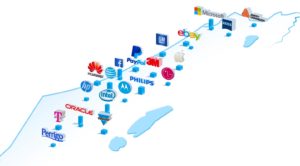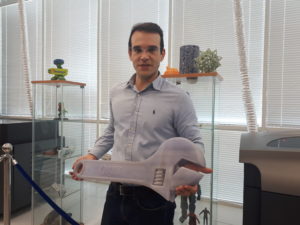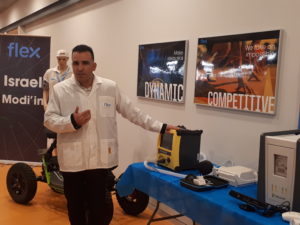Sharp rise seen in foreign direct investment and production across all sectors
Israel’s economy is booming amid a spike in foreign direct investment and significant growth in advanced manufacturing.
American investors and multinational companies continue to be the most significant foreign players in the Israeli business arena, accounting for the lion’s share of capital flow, Ziva Eger, chief executive of the Foreign Investments and Industrial Cooperation Authority at the Israeli Economy Ministry, told The Media Line.
Moreover, Israel has seen a steep rise in production in recent years, with more than half of advanced manufacturing multinational corporations operating in the country having entered between 2008 and 2018.
“We have more than 250 multinationals from America,” said Eger, who also heads Invest in Israel, the Economy Ministry’s arm tasked with helping foreign investors.
“Most of them are here doing production and R&D [Research and Development] in all the sectors. [Americans] have always been the majority because they’re our partners in defense, in the automotive industry and in life sciences, etc,” she said.
 [1]
[1]Screenshot from a video produced by Invest in Israel that highlights some of the MNCs across the country. (Invest in Israel)
According to the Tel Aviv-based IVC Research Center, American investment accounted for 35% of the capital raised by Israeli companies in 2013-2018. Invest in Israel, meanwhile, reported that Israel finished 2018 with almost $22 billion in foreign direct investment and currently has over 300 multinational corporations operating R&D facilities in the country.
A quarter of all multinational corporations in Israel have advanced manufacturing operations in the country. Eger said that companies and investors were choosing to work in Israel because the country offers a number of incentives, among them reduced corporate tax rates and a broad range of grants. The World Bank, in its “Doing Business 2020” report, recently ranked Israel 35th out of 190 countries in the ease of doing business, up 14 spots from a year earlier.
“At the end of the day it’s all about business. As long as you have a stable economy, a platform that can support your production and the R&D nearby across the road, you can have it all [in Israel],” Eger said.
Give the gift of hope
We practice what we preach:
accurate, fearless journalism. But we can't do it alone.
- On the ground in Gaza, Syria, Israel, Egypt, Pakistan, and more
- Our program trained more than 100 journalists
- Calling out fake news and reporting real facts
- On the ground in Gaza, Syria, Israel, Egypt, Pakistan, and more
- Our program trained more than 100 journalists
- Calling out fake news and reporting real facts
Join us.
Support The Media Line. Save democracy.
3D Printing a Leading Industry
One of the top industries in Israel attracting significant attention from American investors is 3D printing, an industry that is revolutionizing how things are made. The Israeli government estimates that the country manufactures roughly 40% of all 3D printers worldwide. By 2024, the sector is expected to have annual revenue of $35.6 billion, according to a 2019 report by Wohlers Associates.
Founded in 1989, leading multinational company Stratasys specializes in 3D printing solutions for the aerospace, automotive, health, design and consumer products industries, among others. In 2012, Stratasys merged with the privately held Israeli company Objet Ltd. Stratasys is currently simultaneously headquartered in Eden Prairie, Minnesota, and Rehovot, Israel. It has over 2,300 employees in 31 locations worldwide.
 [3]
[3]Yehuda Rozilyo, senior R&D design manager at Stratasys, holds a large 3D-printed wrench in the company’s Rehovot facility, Feb. 10, 2020. (Maya Margit)
Stratasys is involved in several cutting-edge projects, including one that will see it provide more than 100 3D-printed parts for NASA’s Orion spacecraft, which will carry astronauts to the moon. The initiative is taking place in collaboration with Lockheed Martin and features components made from a special thermoplastic designed to withstand the extreme temperatures of space travel.
Yonah Lloyd, vice president of investor relations at Stratasys, told The Media Line that the majority of the NASDAQ-listed company’s investors were from the US, which is also its largest sales location.
“Because we’re a public company, the investor list can shift from time to time, based on investors who get in or out of the stock,” Lloyd explained. “Today, our largest investor is Ark Investment Management from New York. They own approximately 8.46 million shares, or a little over 15% of the shares outstanding.”
Lloyd added that Ark had a specific fund for Israeli investments, as well as one for 3D printing companies.
“They clearly believe in the technology coming out of Israel,” he stressed.
As Israel continues to foster economic and technology ties with China, some are concerned the Jewish state will get caught in the crosshairs of the ongoing US-China trade war. However, Lloyd said that so far this issue had not affected Stratasys.
“We have to manage the shipping of our systems that are in various stages − whether during manufacturing or as finished goods − so we have to be sensitive to what’s happening in terms of the situation with China, but it hasn’t had a material impact on the business,” he said.
 [5]
[5]3D-printed models created by Stratasys for the health care industry, Feb. 10, 2020. (Maya Margit)
Shifting Away from China
In recent years some business executives have noticed a significant shift of their workforce away from China to other parts of the world, including Israel.
Flex is a Silicon Valley-based multinational that provides end-to-end services for various industries. The company employs 200,000 workers in 100 sites around the globe, and has several production facilities in Israel. In Israel, Flex makes roughly 6,000 products.
“Ten years ago, about 70% − let’s say about 150,000 [of our] employees − worked in China,” Rafi Hadad, head of business development at Flex Israel, said during a press tour of the company on Monday.
 [6]
[6]Rafi Hadad, head of business development at Flex Israel, speaks during a tour of the company’s facilities on Feb. 10, 2020. (Maya Margit)
He said more and more multinationals were looking to move at least part of their workforce to Israel because of tax incentives, advantageous bilateral agreements with other countries and lower customs rates.
“Today, less than 40,000 of our employees work in China,” Hadad continued. “Other regions have grown significantly like Mexico, Eastern Europe, even Israel. Twenty years ago we started in Israel with two employees, and now we’re at 4,000.”

